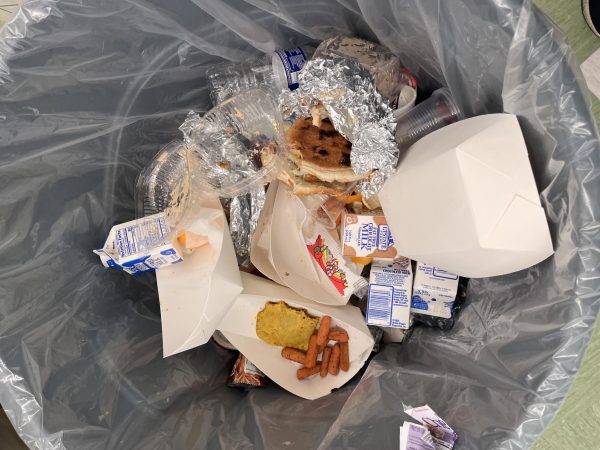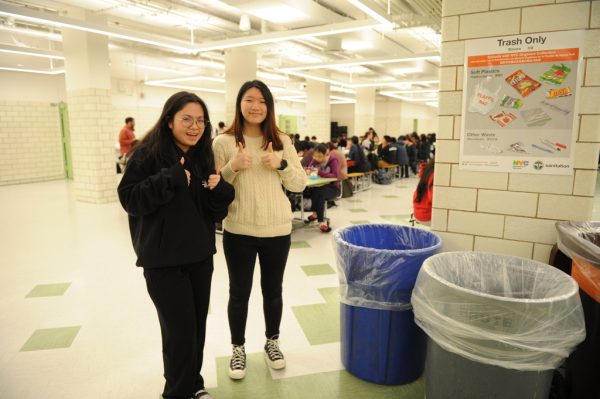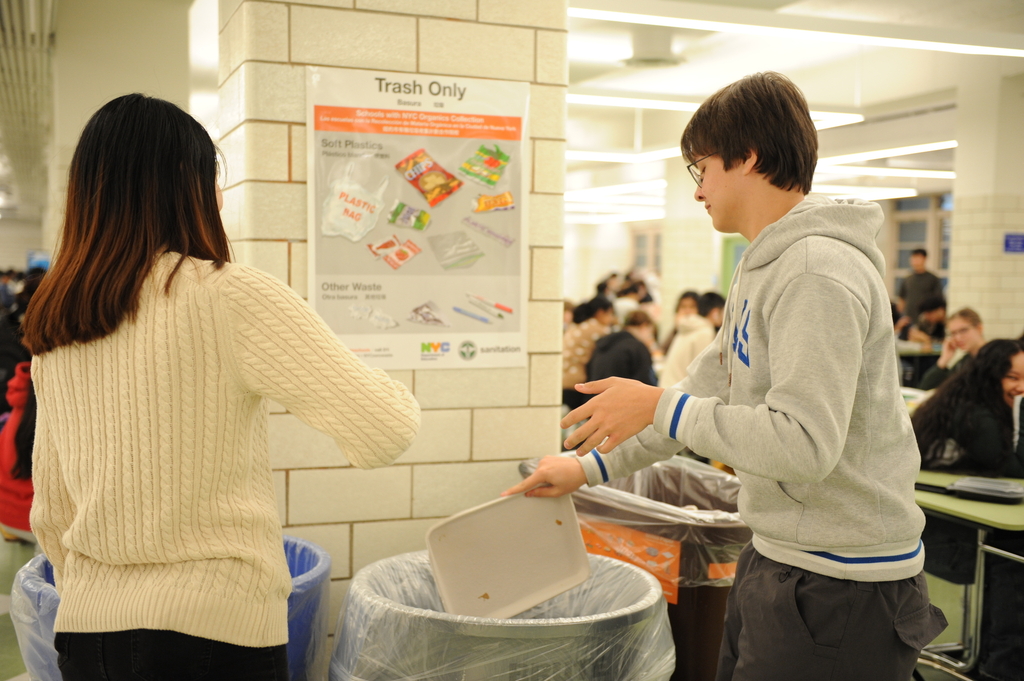You’re in the middle of a lively discussion with your friends when loud, scratchy music interrupts, signaling the end of the lunch period. Reluctantly, you stand up, continuing your conversation as you walk past the garbage bins and throw out your leftovers.
Prior to last year, Bronx Science treated every type of waste as trash. Garbage flowed from these gray cafeteria bins to local transfer stations to compacted blocks that DSNY employees loaded into large orange containers. Trains and trucks transported these to other cities and states up to 600 miles away, such as Ohio, Virginia, and even South Carolina.
Here, the remains of your lunch rotted in landfills along with the rest of New York City’s six million annual tons of waste. As the materials began to decay, they released methane that warmed the atmosphere and pollutants that contaminated rainwater and groundwater. It’s a long, seemingly endless process: metal soda cans take 350 years to decompose, plastic bags last for 1,000 years, and glass bottles have an estimated 1 million year-long lifespan. Evidence of last year’s meals will be preserved in the landscape of distant future generations.
That’s why Bronx Science recently joined the citywide initiative to foster responsible waste habits. In early 2023, the cafeteria acquired several new waste disposal stations, each with five bins separating liquids, hard plastics and glass, paper, trash, and compost.
We currently have the infrastructure in place to properly dispose of our school’s 600 daily bags of waste. Yet we’re only producing one usable bag of compost each day because of cross-contamination between bins. Now, the question is how to train and educate people to properly utilize this privilege.
At the forefront of this ongoing transition has been several members of the school community: the Sustainability Team, the student-led Green Team, and members of the nonprofit Zero Waste Schools. Together, these people have been working to improve Bronx Science’s environmental footprint. Their actions serve as examples for the rest of us to follow.
FIRST STEPS FORWARD
We had just sat down to talk in the Social Studies Office when Mr. Geoffrey Hockert glanced over at the bins by the doorway – one large trash bin resting beneath a chart on how to sort recycling, one smaller blue bin a little ways away. “Wait, one second, I need to fix that,” he said, walking over and quickly swapping their positions.
On top of his responsibilities as a Social Studies teacher and Green Team advisor, Mr. Hockert is a member of our school’s Sustainability Team. He participates in monthly meetings alongside Assistant Principal Ms. Phoebe Cooper, Mr. Michael McGrath (AP of the Physical Education department), Ms. Vana Loukissas (Director of Safety and a Physical Education teacher), representatives of the food service staff, and the custodians, in order to plan how to raise awareness about recycling procedures. It’s an important job, especially since – as proven by the office’s mixed-up bins – even teachers tend to forget proper protocol.

Mr. Hockert explained that the key to better waste management is fostering new behaviors. “Hopefully in your generation there are habits of taking a minute and thinking – habits that are formed early enough in your life that you don’t have to be retrained like older generations,” he observed.
Unfortunately, those habits haven’t become ingrained in the student body yet. In the months that followed after implementing separated cafeteria bins last year, the distinction between them became increasingly hazy. A quick peek into any given one would reveal a mix of compostable lunch trays, plastic water bottles, and cardboard cartons. The bins are currently so severely contaminated that the custodians must treat almost everything as trash. However, the Sustainability Team is advocating for the school to be able to resume proper waste management.
To start, they hope to correct misconceptions among students about which materials are recyclable and compostable. One common mistake involves school lunch utensils – the yellow ones are biodegradable, while the white ones are plastic. Neither should be thrown in the trash.
“Almost everything in the school lunches was designed to be either recyclable or composted. It’s the sorting and disposing part that’s broken in the system,” Mr. Hockert explained. Although the trash bins are the same size as the other bins, this is misleading, he continued. They shouldn’t be overflowing at the end of each lunch period because only about 10% of all of Bronx Science’s waste is actually trash.
Eventually, the Sustainability Team hopes to expand their focus beyond the lunchroom. The goal is for students to apply these skills while using the classroom and hallway bins as well, and continue to do so outside of Bronx Science throughout their everyday lives.
“It isn’t just about forming the habit of sorting waste in school. When you get home, you’ll practice the same habits because the same system exists,” Mr. Hockert said.
STUDENT-DRIVEN ACTION
On Monday afternoons, Mr. Hockert advises the Green Team, a club created to promote eco-friendly behavior. The Green Team recently trained student volunteers to monitor the cafeteria bins during some lunch periods, reviving an initiative that they had previously done for a couple months last school year. The goal of these volunteers is to ensure that their peers correctly dispose of leftovers, with the primary objective of protecting the compost bin from non-organic materials.
“Although many people believe that throwing out one piece of trash into the wrong bin will have no impact, it really does, and I can’t emphasize this enough,” said Green Team secretary Sophia One ’25. “For every [piece of] trash thrown into the wrong bin, it can contaminate the entire bin and it can no longer be composted or recycled.”
In addition to the volunteer program, the Green Team has also sent representatives to explain responsible recycling at an S.O. cabinet meeting, hosted the Earth Fair, and sponsored environmental action days throughout the year.

Last school year, a group of Bronx Science students took the movement a step further by contacting and collaborating with members of the city and state governments, including Mayor Eric Adams. Led by Heeta Thakkar ’24, they founded Zero Waste Schools, a nonprofit distinct from the NYC DOE program bearing the same name. Zero Waste Schools campaigned for environmentally friendly legislation in New York state while also raising twenty thousand dollars to pay for the twenty-three Centralized Recycling Systems currently scattered throughout our hallways.
All of these people are attempting to transform Bronx Science through leadership meetings, fundraising, and school events. However, without the cooperation of the rest of the student body, they alone can make little substantial change. “We need educators and enforcers. And the students have to do it,” Mr. Hockert said. Citing Bronx Science’s reputation, he expressed his desire for our school to be a leader amongst others regarding waste management.
As members of the school community, it’s our responsibility to join the Sustainability Team, the Green Team, and Zero Waste Schools in reshaping our habits and increasing awareness. This can be anything from taking an extra second to sort your waste to volunteering to be a lunch monitor and receiving NHS credit for your work. Reforming Bronx Science’s waste management is just the first step towards future discussions about other ways to shrink our environmental footprint – conserving electricity, for example, or using less water.
“If you care what the Earth is going to look like in ten years, you must start taking action early,” Sophia One said, stressing how just one person’s choice to recycle can break the herd mentality and lead others to wise decisions as well.
Mr. Hockert took a more introspective view of the situation.
“Some people care, some people just don’t,” Mr. Hockert said. He leaned forward, setting his elbows on the desk. “But I think most people do care.”
“If you care what the Earth is going to look like in ten years, you must start taking action early,” Sophia One ’25 said, stressing how just one person’s choice to recycle can break the herd mentality and lead others to wise decisions as well.

